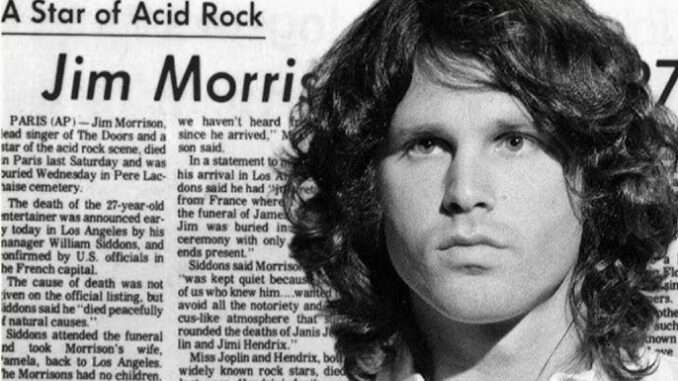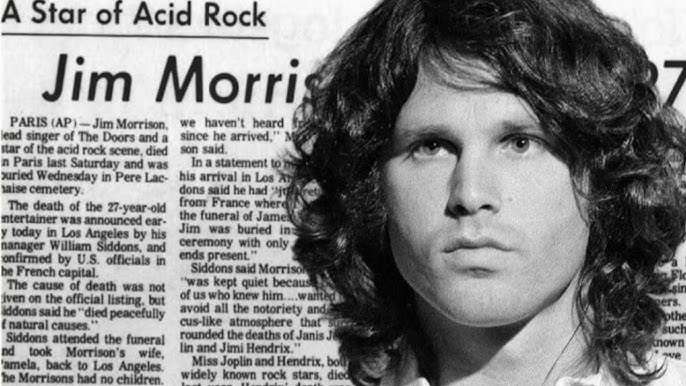
More than five decades after his death, Jim Morrison remains one of rock and roll’s most iconic—and enigmatic—figures. The lead singer of The Doors, known for his poetic lyrics, magnetic stage presence, and destructive lifestyle, died under mysterious circumstances in Paris on July 3, 1971, at the age of 27. Officially, his cause of death was listed as heart failure, but the lack of an autopsy, conflicting witness accounts, and the mythic aura surrounding Morrison have fueled conspiracy theories and unanswered questions ever since.
The Official Story
In the summer of 1971, Jim Morrison was living in Paris with his longtime girlfriend, Pamela Courson. Having left the chaotic Los Angeles music scene behind, he was reportedly trying to clean up, write poetry, and escape the pressures of fame. On the night of July 2, Morrison complained of feeling unwell after a night out. According to Courson, the following morning she found him dead in the bathtub of their apartment on Rue Beautreillis.
The official cause of death was listed as heart failure, though no autopsy was performed because French law at the time did not require one if foul play was not suspected. His death certificate was issued swiftly, and Morrison was buried quietly at the Père Lachaise Cemetery in Paris—his grave now a pilgrimage site for fans around the world.
No Autopsy, No Closure
The decision not to perform an autopsy remains one of the most controversial aspects of Morrison’s death. Given his notoriety and history with drugs and alcohol, many found it suspicious that there was no deeper investigation into what caused the 27-year-old rock star’s sudden demise. 
Adding to the mystery, Morrison’s friends and bandmates were not informed of his death until several days later. Ray Manzarek, keyboardist of The Doors, later said he believed the band was deliberately kept in the dark. “It was all very, very strange,” Manzarek remarked in an interview. “I never really bought the whole story.”
Alternate Theories
Over the years, various alternative theories have emerged, ranging from the plausible to the fantastical. One widely circulated rumor suggests that Morrison died of a heroin overdose in a Paris nightclub and that his body was quietly transported back to his apartment to avoid a scandal. Several individuals, including Sam Bernett, a former manager of the Rock ’n’ Roll Circus nightclub, have claimed that Morrison collapsed in the bathroom of the club after snorting what he believed was cocaine—but was actually heroin.
Another persistent rumor is that Morrison faked his own death to escape fame and the increasing toll of addiction. Fueling this theory are reports of later “sightings” in far-flung places like India, Africa, and the American Southwest. These claims are largely discredited, but they continue to resonate with fans who view Morrison as a modern-day Rimbaud—a poet too wild to be tamed or understood.
The 27 Club and the Price of Fame
Morrison’s death came just two years after the deaths of Jimi Hendrix and Janis Joplin, both also at 27. The coincidence helped solidify the idea of the “27 Club”—a term used to describe talented musicians who died at that age, often from drug-related causes or under mysterious circumstances. Morrison’s passing added to the tragic mystique of the era: artists who burned bright and fast, leaving behind brilliant work and endless speculation.
The Doors released only six studio albums during Morrison’s lifetime, but their impact on rock music and culture was seismic. With tracks like “Light My Fire,” “The End,” and “Riders on the Storm,” Morrison pushed the boundaries of what lyrics could express, blending music with surrealism, existentialism, and eroticism. His death, sudden and opaque, seemed like a final performance—cryptic, provocative, and unresolved.
Legacy in the Shadows
Today, Jim Morrison remains as much a symbol as a singer. His grave in Paris draws thousands each year, often adorned with flowers, graffiti, and notes from fans. Books, films, and documentaries continue to explore not just his music, but his mystique—a mystique heightened by the unanswered questions surrounding his death.
Whether Morrison died of natural causes, an accidental overdose, or something more sinister may never be definitively known. But the mystery itself has become part of the Morrison mythos—an unfinished stanza in the life of rock’s most poetic frontman.
As Morrison once wrote, *“Did you have a good world when you died? Enough to base a movie on?”* For Jim Morrison, the world he left behind is still searching for the ending to that story.
Leave a Reply